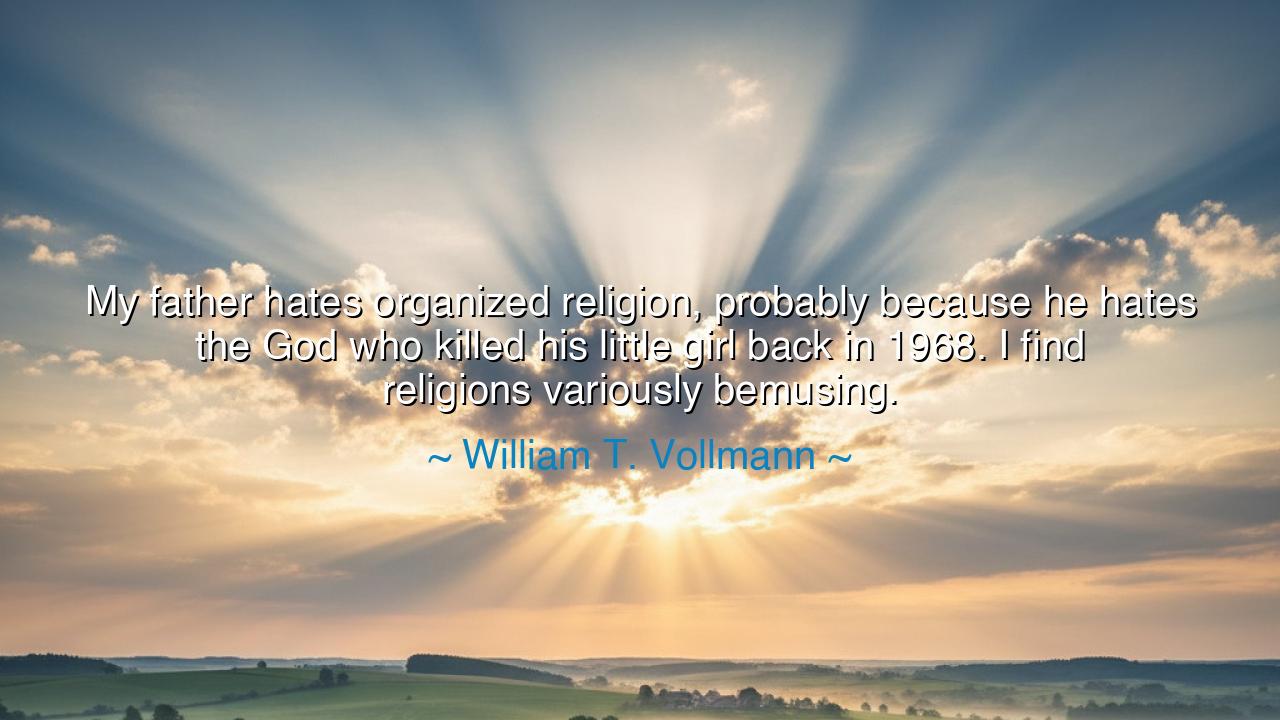
My father hates organized religion, probably because he hates the
My father hates organized religion, probably because he hates the God who killed his little girl back in 1968. I find religions variously bemusing.






Hear, O seekers of sorrow and truth, the anguished confession of William T. Vollmann: “My father hates organized religion, probably because he hates the God who killed his little girl back in 1968. I find religions variously bemusing.” In these words is not only the voice of a son describing his father’s wound, but also the cry of humanity itself as it wrestles with grief, faith, and the silence of heaven. For the loss of a child has broken the hearts of countless men and women, and in that breaking, many turn their anger not only upon fate but upon God.
The origin of this saying is deeply personal, rooted in the tragedy that struck Vollmann’s family when his sister died in childhood. The father, crushed by grief, looked upon organized religion not as comfort but as betrayal, for its God had allowed such a wound. The son, standing between faith and rejection, describes his own perspective as one of distance—finding religion bemusing, puzzling, curious, neither wholly embraced nor wholly despised. In these layered words lies the eternal human struggle: how to reconcile belief in a divine order with the raw reality of suffering.
The ancients, too, grappled with this riddle. The story of Job tells of a righteous man who lost his children, his wealth, his health, and cried out against God. Job’s friends, representing the voices of organized religion, told him to accept his fate as punishment. Yet Job refused their neat answers, demanding truth from the Almighty. And though he never fully understood, his wrestling itself became a kind of faith. In this we see Vollmann’s father mirrored: one who, faced with unbearable loss, could not endure the easy words of religion and instead turned away in bitterness.
History offers other reflections. When Abraham Lincoln lost his young son Willie in 1862, the grief nearly destroyed him. He wandered the White House, broken, clinging to fragments of belief, unsure of how to reconcile his sorrow with the providence of God. Yet from that suffering emerged a deepened compassion, and in his later speeches—especially at Gettysburg—one hears the voice of a man who had wrestled with pain and found a form of faith shaped not by certainty but by endurance. His journey reminds us that grief may shatter belief, but it can also forge a deeper, humbler spirituality.
The meaning of Vollmann’s quote is thus both personal and universal: grief can drive a wedge between humanity and religion. For some, suffering deepens faith; for others, it hardens into rejection. The father’s hatred of organized religion is the cry of a man betrayed by promises of a loving God. The son’s bemusement is the stance of one who observes from a distance, wary of simple answers, yet still curious about the rituals and teachings that so many find sustaining. Between them lies the whole spectrum of human responses to the mystery of suffering.
The lesson for us, O listeners, is this: do not judge too quickly the faith or faithlessness of the grieving. For the wound of loss is holy ground, where easy answers die and silence reigns. To comfort the suffering is not to preach, but to stand beside them, to weep with them, to carry with them the weight of their sorrow. Organized religion must beware of offering hollow explanations, and instead learn to offer presence, compassion, and patience. Only then can it serve rather than alienate.
Practical steps stand before you: If you yourself grieve, give yourself permission to question, to doubt, even to rage at God, for the ancients did the same. If you walk beside one who grieves, offer not explanation but love. And if you practice religion, remember that its highest calling is not dogma but compassion, not ritual but relationship. Faith that does not bend to comfort the broken is not worthy of the name.
Thus remember the teaching hidden in Vollmann’s sorrow: religion without compassion becomes brittle, and grief without space for questioning becomes unbearable. If you would live wisely, hold both truths together—accept that pain can break faith, but also that compassion can heal it. And know this: the soul that wrestles, even in anger, is not far from God, for in wrestling it still longs for meaning. This, O children of sorrow, is the mystery of religion, grief, and love.






AAdministratorAdministrator
Welcome, honored guests. Please leave a comment, we will respond soon